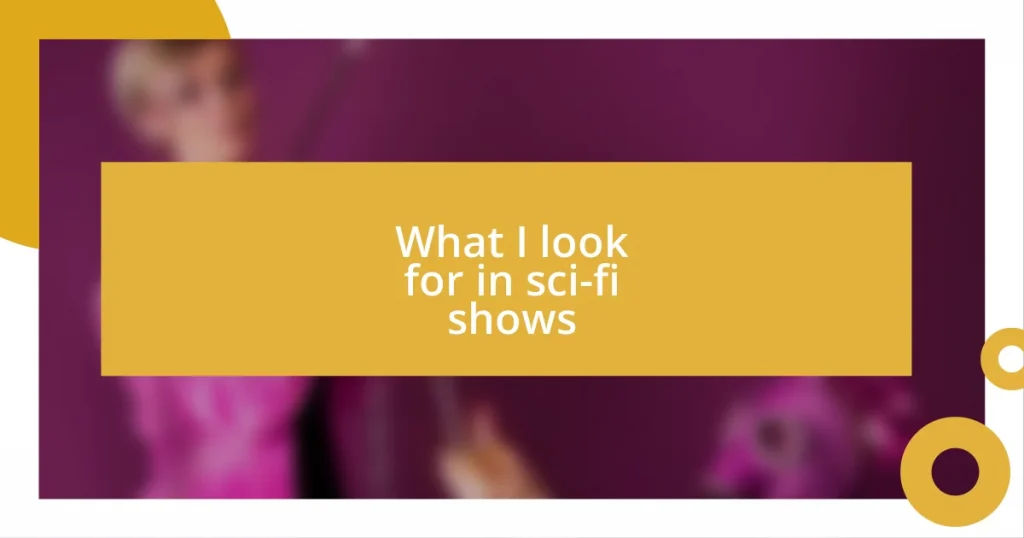Key takeaways:
- Understanding character development involves analyzing goals, motivations, and conflicts, which create relatable and engaging narratives.
- Character arcs can be identified through key elements like goal setting, conflict, resolution, and relationship dynamics, enhancing viewer engagement.
- Thematic relevance in stories shapes character growth, connecting their journeys to broader human experiences and prompting personal reflections in viewers.
Understanding character development techniques
Character development techniques often revolve around defining a character’s goals, motivations, and conflicts. I remember watching a series where the protagonist faced a moral dilemma that forced me to question my own values. Isn’t it fascinating how a character’s internal struggles can mirror our own life choices?
One powerful technique is transformation arcs, where characters experience significant change throughout the story. I’ve seen shows where characters start as villains but evolve into heroes, making me wonder, what leads someone to such a dramatic shift? This journey not only keeps viewers engaged but also draws them into a shared experience of growth and redemption.
Another technique to consider is the use of relationships. I recall a show where two characters had a tumultuous friendship that evolved into something deeper. Watching their dynamic unfold made me reflect on how our own relationships shape who we are. Have you ever noticed how a single connection can catalyze profound character shifts? This interplay adds layers to the narrative, creating a rich tapestry of emotional depth.
Identifying character arcs effectively
Identifying character arcs in a show is all about recognizing those pivotal moments that signal change. I’ve often watched a character start in one emotional state only to transform dramatically by the finale. For instance, I remember a series where a seemingly apathetic character gradually became a compassionate leader, and each episode built upon their struggles and victories, making the evolution feel satisfying and authentic.
To effectively identify character arcs, consider these key aspects:
- Goal Setting: What does the character want, and how does it change?
- Conflict: What internal or external challenges do they face that drive their development?
- Resolution: How do their experiences shape their final state?
- Relationship Dynamics: How do interactions with other characters influence their growth?
- Consistency: Are the changes believable and earned throughout the narrative?
Reflecting on these elements can vastly enhance your understanding of a character’s journey, making each revelation more impactful.
Analyzing relationships and interactions
When analyzing relationships and interactions in shows, I find that one of the most revealing aspects is how characters evolve through their connections with one another. For example, I once watched a drama where a character’s rivalry transformed into a deep-seated friendship over several seasons. The slow burn of their relationship felt authentic and added dimensions to both characters. This reminds me how, in real life, our interactions can deeply influence our growth. Have you experienced a friendship that changed your perspective?
Furthermore, the complexity of relationships often lays bare a character’s true nature, exposing both strengths and vulnerabilities. There was a particularly memorable scene in a series I enjoyed where a mentor figure confronted their protégé, sparking a realization that led to a significant turning point for both. Such moments highlight the importance of interpersonal dynamics in character development. How do you think these connections can lead to surprising character revelations?
Ultimately, the interplay between characters often reveals hidden layers of their personalities. I remember a show where seemingly minor interactions between side characters led to pivotal moments in the main storyline. It demonstrated that every relationship, no matter how brief, can leave an imprint. In my viewing experience, I’ve seen that well-crafted relationships not only drive the plot but also foster depth and authenticity in character arcs.
| Type of Relationship | Impact on Character Development |
|---|---|
| Friendship | Encourages growth, exploration of identity |
| Rivalry | Stirs conflict, fuels ambition, reveals flaws |
| Mentorship | Guides transformation, imparts wisdom |
| Romantic | Challenges priorities, exposes vulnerabilities |
Assessing character growth and change
Assessing character growth is often about discerning the subtle shifts that occur over the course of a narrative. One show I followed closely had a character who started off incredibly selfish but eventually learned the value of selflessness through a series of eye-opening experiences. It’s those tiny moments of realization—often nestled between dramatic events—that really resonate and showcase profound character change. Have you noticed how sometimes the most impactful transformation happens in quieter, less dramatic scenes?
As I reflect on my viewing habits, I realize that examining how a character reacts to their circumstances can reveal a great deal about their development. For example, I once watched a thriller where a character constantly avoided responsibility, but after facing a life-threatening situation, they stepped up to save others. That courageous act felt earned and highlighted their remarkable growth, making me root for them even more. Isn’t it fascinating how a single decision can encapsulate an entire arc of evolution?
Moreover, I’ve come to believe that timing plays a critical role in expressing character growth. In a particular series, there was a scene where a formerly anxious character faced their biggest fear in a tense moment. It was not just about conquering the fear; it was an embodiment of their journey. I felt a rush of pride, as the scene mirrored my own experiences facing challenges. Could it be that these moments of bravery connect us to our own struggles and triumphs, making the character’s journey even more profound?
Exploring motivations and conflicts
Motivations are what truly drive characters, and understanding them can illuminate the entire narrative. I recall watching a series where a character’s hidden past significantly shaped their actions; it was a constant tug-of-war with their desires and fears. Seeing how motivations stem from personal histories helped me realize that our own backgrounds often dictate our decisions, doesn’t it?
Conflicts arise when these motivations clash, both internally and externally, creating tension that makes the story compelling. I vividly remember a character whose ambition pushed them to betray a friend for success. That conflict not only revealed their vulnerabilities but also made me ponder how ambition can sometimes cloud judgment. Have you ever found yourself in a position where your aspirations conflicted with your morals?
Exploring these intricacies allows for a deeper appreciation of character arcs. I once became immersed in a show that showcased a character wrestling with the consequences of their choices in a morally ambiguous world. Each decision felt heavy, resonating with my own experiences when I’ve faced crossroads. It’s in these moments of conflict that I find the most relatable characters, reminding me of the complexities of real life. After all, don’t we all have motivations that sometimes lead us into conflict?
Evaluating thematic relevance in shows
Thematic relevance in shows can often serve as the backbone of character development, seamlessly intertwining the characters’ arcs with larger messages. I remember watching a drama where the themes of redemption and forgiveness were intricately woven into the storyline, giving the characters’ journeys a profound purpose. Each time a character grappled with their past mistakes, I couldn’t help but reflect on my own life, questioning if I, too, had moments where I sought forgiveness. How crucial is it, then, for stories to resonate with our collective human experiences?
Applying character analysis to critiques
Evaluating character development through analysis can dramatically enhance our critiques of shows. I remember watching a series where I meticulously dissected how each character’s choices influenced the plot. It became clear to me that these choices revealed deeper layers of personalities that might otherwise go unnoticed. What if we viewed every character’s decision as a reflection of both their inner struggles and the larger themes at play?
When I critique a show, I often ask myself how well the characters align with the overarching narrative. There was a time when a seemingly one-dimensional villain surprised me with a tragic backstory that shifted my perspective entirely. This revelation not only enriched my understanding but also challenged my initial bias against them. Isn’t it fascinating how character depth can lead us to reconsider our judgments, transforming antagonists into figures that evoke empathy?
Incorporating character analysis into my critiques allows me to appreciate the subtleties of storytelling. Recently, I watched a show that presented a protagonist who faced not just external obstacles but also profound self-doubt. Their journey mirrored my own experiences with uncertainty, making me question what true strength means. Through this lens, I realized that character flaws are often what resonate most with audiences, encouraging us to embrace our imperfections. Have you ever felt a character’s struggles echo your own, revealing more about your journey in the process?












